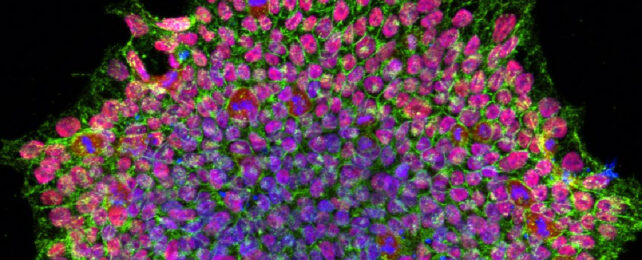Scientists have developed a new method of reprogramming cells to be better suited for use as stem cells. Induced pluripotent stem cells (iPSCs) have been used in medical research since 2006, allowing scientists to model diseases and develop therapies. However, iPSCs still retain some genetic reminders of their previous state as fully developed tissue, limiting their use as a blank slate. The new method, called transient-naive-treatment (TNT) reprogramming, mimics the reset of a cell’s epigenome that occurs during early embryonic development. In a series of cell experiments, researchers showed that TNT reprogramming effectively erases epigenetic memory, allowing the reprogrammed cells to better resemble embryonic-like stem cells in function and on a molecular level. This breakthrough could have significant implications for cell therapies and biomedical research, advancing their progress and potentially replacing damaged or diseased tissues. The study has been published in Nature.

How does the “transient-naive-treatment” (TNT) reprogramming technique enhance the potential of induced pluripotent stem cells (iPSCs) for use in stem cell research?
Scientists Achieve Major Breakthrough in Reprogramming Cells for Stem Cell Research
In a captivating scientific development, researchers have unveiled a groundbreaking method for reprogramming cells, making them more suitable for use as stem cells. Induced pluripotent stem cells (iPSCs), a game-changer in medical research since 2006, have allowed scientists to advance disease modeling and therapy development. However, iPSCs have always carried a genetic trace of their former fully developed tissue state, limiting their potential as a true blank canvas.
Enter the game-changing “transient-naive-treatment” (TNT) reprogramming technique. Inspired by the cell’s epigenome reset during early embryonic development, this cutting-edge method ensures that iPSCs can now fully shed their epigenetic memories. The results of a series of cell experiments are simply stunning – reprogrammed cells now closely resemble embryonic-like stem cells both functionally and on a molecular level.
This breakthrough discovery is poised to revolutionize the field of cell therapies and biomedical research. By advancing progress in these crucial areas, the TNT reprogramming technique holds the promise of eventually replacing damaged or diseased tissues. The potential impact on human health cannot be overstated.
The study, published in the esteemed journal Nature, reveals a thrilling new chapter in our quest for advanced medical treatments. With the rapid pace of discovery set to continue, we can only imagine the incredible breakthroughs on the horizon. Brace yourself for a future where we unlock the secrets of cellular reprogramming, paving the way for unprecedented advancements in healthcare.


This is groundbreaking! The future of regenerative medicine looks even more promising now. #STEMcells #medicalresearch
Wow, the potential implications of this breakthrough are mind-blowing! Can’t wait to see how it revolutionizes the field of medicine. #stemcellresearch #scientificadvancement